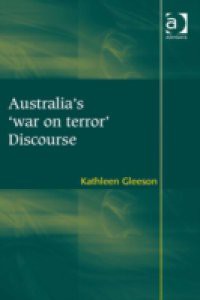Too often, existing literature has conflated the discourses that enabled the 'War on Terror', ignoring the contextual specificities of the states that make up the Coalition of the Willing. Australia's 'war on terror' Discourse fills this gap by providing a full and sustained critical analysis of Australian foreign policy discourse along with the theoretical synthesis for a specific model of critical discourse analysis of the subject.The language of then Prime Minister Howard is the primary focus of the book but attention is also paid to the language of key ministers, political opponents and other prominent actors. The voices of those who challenged the dominant discourse are also considered to shed light on the ways in which discourses can be destabilised. Kathleen Gleeson shows how Howard successfully invoked narratives of identity and sovereignty that resonated with his audience and promoted his reworked narrative of Australia whilst facing dissent from many actors who voiced their opposition most successfully when they capitalised on inconsistencies within the discourse.

